#the playwright’s death he’s just like that.
Explore tagged Tumblr posts
Note
just saw asteroid city last night, pls explain the proposed significance of the kiss!!
answering this publicly hope thats ok! cant do a readmore im on mobile *****asteroid city spoilers below beware*****
i dont remember anyones names so this is gonna sound partly unhinged. okay so the edward norton playwright and jason schwartzman actor (not character, in the black and white parts) are lovers right. tbh i thought this was kind of a gag and forgot about it. but later we find out that the playwright died 6 months into the production. i didnt make the connection that THAT’s why the actor-jason has to suddenly leave the stage and freaks out backstage about how he’s not sure he’s Doing it right. hes not talking about acting!! because he himself is literally grieving his lover while he’s playing a character who’s grieving his wife written by his lover so obviously it’s too much!!! actor-jason is trying to find meaning in his death through his writing but there isnt any meaning in death [gerris drinkwater voice] which is what the play is trying to say anyway. he doesnt think he’s performing grief right even in his own life!!! (and tbh it’s the 50s so he wouldnt be able to perform grief publicly anyway!!!!) the play starts with a car accident… anyone would search for some hidden meaning there, some sign…. so when he talks to margot robbie outside it’s not really about finding the CHARACTER’s motivations it’s about the actor himself being able to process the playwright’s death! and adrien brody director was probably also dealing with that too (him and norton seemed to be good buddies) so the whole “sleeping backstage” thing gets a bit sadder maybe? maybe everyone else got this in the theatre and im just stupid lol but crazy making stuff to me!!! the whole story is about sublimated gay grief that cannot be expressed?!?!
the tweet that caught me onto this was here which posits that the playwright’s death was a suicide but i think that’s pretty stupid and unnecessary because the whole thing about the play asteroid city is that death is random and meaningless. im pretty sure that’s what the alien represents— a shocking and absurd event that isnt outright evil or menacing, not something anyone can predict or make sense of, it’s just a thing that happens to you out of nowhere, it doesnt mean anything. he’s a little black figure, he’s death! giving and taking! aagh
#you’re the wife who played my actor :(#posthumus#asteroid city#imagine youre in love with a playwright and he writes a play before he even meets you about how you cant get over his death which hasnt#happened yet. id go insane too#im going to see it again to see how this informs the whole thing because its driving me crazy#rewatching the performances knowing that they're performing people performing. augh.#remember when bryan cranston accidentally appears in frame. rending my garments#also ‘you cant wake up until you fall asleep’ confused me a bit but then i remembered that the margot robbie scene was supposed to be put o#as a dream sequence and it makes sense now. thanks#aliens are the new fairytale monster symbol of death. the ultimate Unknowable#EDIT okay i read the wikipedia summary got some facts wrong adrien brody is sleeping in the theatre during rehearsals so its not because of#the playwright’s death he’s just like that.
2K notes
·
View notes
Text
yeah speaking of the most personal instrument of death / brutal vengeful catharsis gay sex foil confrontation. the musician gets got by lo cocodrilo? respectively, give him a kiss
#bsol#obv wouldn't happen in canon for various reasons. i wouldn't ask it to nor would i even say express this via a fic w/One Change thusly#but i would express it in a post. add a layer of Hmm >:/ ah jeez And i'm gay#already dealing w/the Emotional Defeat of [lo cocodrilo's approach fails & he's known/knows it And he's been failing At It]#as per the nature of ''the conflict w/the antagonist provides a protagonist's emotional conflict w/himself in ways'' final confrontation#just also a whimsical doubling down on ''& i don't even want to kill You / won't if i can help it'' + dealing w/defeat And gay awakenings?#imagine. though also i do already hold a pinch of that re: AU where that all happened but deaths were Figurative / Emotional only#introducing you to This special little guy leaping into frame accidentally shooting you [see: figurative / emotional deaths]#in which case i have More Ideas b/c like hey i have ideas for like yeah sure everyone express themselves via gay sex here#but i just personally am not that enthused (not an understatement. nor overstatement. i just mean Not That Enthused)#about the musician / lo cocodrilo. that doesn't mean completely unengaged like yeah there they go as hero / [hero to villain] Foils. nice#the musician just as protagonist & Funny but still representing the As It Were more stoic hardass spaghetti western hero has me like Okay.#the musician / [anyone] like i'm at all engaged; processing; nodding okay like it's inevitably plot & theme pertinent lol#i'm just also not enthused. the musician has all the Factual Textual connection w/banana that is indeed entirely queer even without having#to overlook or change the more normatively premised central relationship with his wife who is kidnapped & that kicks off the plot#but wherein the musician saves banana first thing as like a parallel to saving his own wife; has the friendship song which would not need#to be altered to be a love(tm) song though that doesn't make it necessarily romantic neither/nor not friendship; considers banana living#with (or adjacently to; not made crystal clear) him as part of his ideal life; all Is What It Is like nice got it....not Married to him &#is not interested in at least certain physical intimacy as comparable to Romance Associated intimacies? well how handy#for me to rush in with toppling bowling pins sound effects & grab the funny little guys w/the Failed Efforts At Normative Married Life#wherein i do not then go ''time for their exclusive romantic relationship'' But neither of them are in one already; how helpful#also a whole other idea: in just about anything; throw around kisses on the mouth as Comma type punctuating moments willily nillily. whyn't#that note on the mysteries like there's Too Many Kisses it loses impact. sure probably part of Each Scene By Different Playwrights but#consider this. that reflects the [each scene by different groups] of original mystery cycles. also nondramatic / ''important'' kisses? sure#mwah
0 notes
Text
imagine youre a MEDIEVAL PEASANT in the lord's year 1389 and you go to the tavern with some friends. amidst all the conversation you mention that you're simply NOT GOING TO DIE and the richest man you've ever seen approaches you and asks if you just said you WEREN'T GOING TO DIE. and yeah you agree and he asks you to meet in this tavern of the white horse in ONE HUNDRED YEARS. and you think this guy might be fucking with you or you just sold your soul to the devil but you carry on and surprisingly you HAVEN'T FUCKING DIED YET. but oh well right you go to the tavern in 1489 and THAT GUY IS THERE. and you talk and he asks if you want to live still. you're like fuck yeah man and you go on another 100 years. and you meet your STRANGER yet AGAIN and hes there and you try and convince him to eat or something and he gets distracted by a PLAYWRIGHT. you warn your stranger that this guy ABSOLUTELY SUCKS and is worth none of his time. unfortunately this REALLY HOT AND MYSTERIOUS STRANGER is too enraptured by this godawful playwright and LEAVES YOUR DATE EARLY. but you still want to live and so another century goes by. THIS IS THE WORST CENTURY OF YOUR FUCKING LIFE. you lose EVERYTHING, your wife DIES, your son gets into a TAVERN BRAWL and DIES, will shaxberd is A RENOWNED PLAYWRIGHT, and YOU'RE SO HUNGRY. but you have your centennial date. and this stranger whomst you STILL KNOW ABSOLUTELY NOTHING ABOUT is there and still in the greatest finery. and you eat like an animal in front of him but WHO GAF. and he seems concerned why youd WANT TO LIVE AFTER ALL OF THAT but there's so much more to live for. 100 years and you get into THE ATLANTIC SLAVE TRADE business and your stranger HATES THAT. you realize HE'S RIGHT so you begin to reconsider. you find yourself emboldened and try to ask his name when you're interrupted by A WITCH TRYING TO INVESTIGATE THIS IMMORTAL RUMOR. but that's too much so your stranger blows SAND IN HER EYES and CURSES her with PAST GHOSTS and the date ends. another century and you still have questions, but the date proceeds and you ask your stranger why he ALSO KEEPS COMING BACK. you insinuate that he's LONELY and HE'LL RETURN BECAUSE YOU'RE FRIENDS. he also hates this and storms off. you've BROKEN UP. and you wait and wait for your next date but this guy HE'S LATE ASF. the white horse tavern has been SOLD to YOU, you're a HISTORY PROFESSOR, you're on your 30th LIFE RETCON and suddenly THERE HE IS. you eventually learn that it's because he was IMPRISONED by the OCCULTIST, RODERICK BURGESS, for THE CENTURY and that's why he's late. also that he's THE ENTIRE COLLECTIVE UNCONSCIOUS shambling around in a man shaped suit and a big fuckoff coat. and you two make up for a bit and he promises maybe to see you a bit more. when he does see you again it's because he's about to go on a SUICIDE MISSION to HELL and you're DREAMING. but he leaves you a bottle of your favorite wine that hasn't existed in NEARLY 300 YEARS but that's okay, you guess. a couple of winters pass and you see him AGAIN but in person it's because he thinks he's GOING TO NEVER SEE YOU AGAIN. you go to the bar and he still orders DARK MEAD in MODERN TIMES. he asks if you need anything of him and you say maybe to forget the unending grief about your DEAD WIFE. he grants it and then VANISHES. time passes and you dream of HIS FUNERAL AND HIS WAKE. you meet HIS SIBLINGS, all ENDLESS BEINGS, every single one of his EXES, and fucking batman. YOU WERE HIS ONLY FRIEND. weird fucking dream... but you're at the renfaire with your gf and it's going pretty great. you have a couple beers and sit down in the tavern, doze off. you are woken and chat up some ODDLY FAMILIAR GOTH CHICK. this is DEATH. she tells you about the wager she made with her brother, your STRANGER in 1389 and guides you out somewhere. YOU HAVE DIED. happened to my good friend hob gadling once.
#the sandman#hob gadling#dream of the endless#dreamling#this ended up way longer than i thought it would be#i just really love hob gadling okay#all of this done by memory i have to be insane
302 notes
·
View notes
Text
"At the risk of stating the obvious, no woman can mate with a bull and produce a child. Recognizing this simple scientific fact, I am led to a somewhat interesting suspicion: King Minos did not build the labyrinth to imprison a monster but to conceal a deformed child, his child.
While the Minotaur has often been depicted as a creature with the body of a bull but the torso of a man, centaur-like, the myth describes the minotaur as simply having the head of a bull and the body of a man, or in other words, a man with a deformed face. I believe pride would not allow Minos to accept that the heir to the throne had a horrendous appearance.
Consequently, he dissolved the right of ascension by publicly accusing his wife Pasiphae of fornicating with a male bovine.
Having enough conscience to keep from murdering his own flesh and blood, Minos had a labyrinth constructed, complicated enough to keep his son from ever escaping but without bars to suggest a prison. (It is interesting to note how the myth states most of the Athenian youth "fed" to the Minotaur actually starved to death in the Labyrinth, thus indicating their deaths had more to do with the complexity of the maze and less to do with the presumed ferocity of the Minotaur.)
I am convinced Minos' maze really serves as a trope for repression. My published thoughts on this subject (see "Birth Defects in Knossos"Sonny Won't Wait Flyer, Santa Cruz, 1968) inspired the playwright Taggert Chielitz to author a play called *The Minotaur* for The Seattle Repertory Company. As only eight people, including the doorman, got a chance to see the production, I produce here a brief summary:
Chielitz begins his play with Minos entering the labyrinth late one evening to speak to his son. As it turns out, the Minotaur is a gentle and misunderstood creature, while the so-called Athenian youth are convicted criminals who were already sentenced to death back in Greece. Usually King Minos has them secretly executed and then publicly claims their deaths were caused by the terrifying Minotaur thus ensuring that the residents of Knossos will never get too close to the labyrinth. Unfortunately this time, one of the criminals had escaped into the maze, encountered Mint (as Chielitz refers to the Minotaur) and nearly murdered him. Had Minos himself not rushed in and killed the criminal, his son would have perished. Suffice it to say Minos is furious. He has caught himself caring for his son and the resulting guilt and sorrow ineeses him to no end. As the play progresses, the King slowly sees past his son's deformities, eventually discovering an elegiae spirit, an artistie sentiment and most importantly a visionary understanding of the world. Soon a deep paternal love grows in the King's heart and he begins to conceive of a way to reintroduce the Minotaur back into society. Sadly, the stories the King has spread throughout the world concerning this terrifying beast prove the seeds of tragedy. Soon enough, a bruiser named Theseus arrives (Chielitz describes him as a drunken, virtually retarded, frat boy) who without a second thought hacks the Minotaur into little pieces. In one of the play's most moving scenes, King Minos, with tears streaming down his face, publicly commends Theseus' courage. The crowd believes the tears are a sign of gratitude while we the audience understand they are tears of loss. The King's heart breaks and while he will go on to be an extremely just ruler, it is a justice forever informed by the deepest kind of agony."
House of Leaves by Mark Z. Danielewski
pg. 110-111
2K notes
·
View notes
Text
in stars and time "method actor" au braindump
the people have spoken! welcome to the method actor au! in which i took the theatre themes of isat and stretched them to their absolute limit!
the premise is that instead of saving vaugarde, the party + major side characters (the king and euphrasie) are an acting troop! and they're telling the story of the saviors through a play. Siffrin is playing The Traveller, and over time in rehearsals has really grown to like his castmates (even the one playing the king- he's actually quite sweet!).
it's the opening night! they're more than prepared for the show!
... until they aren't.
All it takes is a faulty prop from the fly tower, and suddenly siffrin is right back where they started the day before, waking up from a nap in the greenroom before the last rehearsal.
they're back at the beginning. they get a second chance.
after all, you only get one opening night, and siffrin is determined to make it perfect.
...all they need to do is make sure the show goes smoothly!
no stage hazards,
no missed lines,
no injuries,
no deaths,
no mistakes.
and if they have to play the hero to do it?
if the lines between them and their character have to blur so that their parts are perfect?
so be it.
the show must go on.
[notes below the cut!]
[spoilers for isat below!]
so yeah, siffrin takes the term "method acting" way too seriously. out of necessity, though. this is a performance, after all! they have to keep it together for the show, and the best way to do that for them is to embrace their role.
setting
still takes place in vaugarde! except yknow. the king isn't actually happening (yet), so instead of a group of saviors we have the acting group playing the saviors! a bit meta, but it works.
craft and the island still are a thing, and play a major part in the overarching story! this is still a time loop, after all!
all of this is taking place on a stage within dormont's house of change! Euphrasie sponsors, and was more than happy to be included for her very short role! The theatre there has been out of use for decades, but Euphrasie sees it fit to resurrect it just for this show!
The party:
Mirabelle is the playwright, having dreamed up a story like the books she loves to read but for the longest time being too afraid to put it down. Euphrasie encouraged her to go through with it, and they've been building the show ever since! she thinks she isn't a good actor, but she's actually very empathetic as the heroine, since she (secretly) based it off herself.
Isabeau was actually the first to audition- and the only one, at least in the first round. He came in last-minute, and after delivering a solid monologue (with a few puns slipped in), Mirabelle was eager to cast him! He actually loves costume design, but he doesn't dare to reveal this to the party, even if he occasionally spends hours in the House's storage room looking through pieces from older performances.
Odile was a surprising addition to the cast. She was interested in Vaugardian tradition, and figured the best way to learn was through the epicenter of vaugardian culture, at a house. She reccomended some plays to mirabelle from her travels, and after giving some pointers on mirabelle's early scripts decided to join in for the hell of it. She likes horror productions in particular, and contributed a lot to the concept of the king's time craft.
Siffrin was visiting the house, and came to see one of the plays... but got the time wrong and came in during a live-reading of the scripts early draft. he stood and watched for a bit before mirabelle noticed, and after a LOT of fumbling and apologies admitted that he loves theatre. Mirabelle practically dragged him in after that. Given that he didn't have anything else to do, he agreed. Despite claiming he's not much of an actor, much preferring to work on the set design, he's actually uncannily good...
The King is... just a guy, actually! very quiet, very reclusive, but after seeing one of mirabelle's casting calls came in and absolutely smashed the audition. he's been with the group ever since! he's pretty busy outside of the production, but he puts his all into his work! He and siffrin have a kind of kinship, given their shared elusive background and... white hair, i guess.
Bonnie is the younger sister of Nille, who worked on trade classes at dormonts house after the two left Bambouche together. Mirabelle needed someone to help make the sets, and Nille volunteered early on in the production, so long as she could bring Bonnie along. Initially Bonnie wasn't all that interested, but after hanging around the cast a bit grew curious. Siffrin caught them reading through one of the scripts and acting out the various parts on their own. After that, Mirabelle made the time to write in The Kid for Bonnie to have a role thats easiest for them! Fun fact- a lot of The Kid's lines are actually ad libs from Bonnie throughout the production. Mirabelle kept writing them into the script as a sort of inside joke.
Euphrasie is mostly the same! As the head housemaiden, she's had a bit of experience with public speaking and acting, and after seeing Mirabelle having such fun she allowed herself to be roped into a small role as The Head Housemaiden in the production.
the story...
Siffrin's first death is actually to a prop rock falling on top of them. When they wake up, they're back in the green room, waking up from a nap. Isa is out by the favor tree as usual, odile is buying food for the cast party, mira is pouring over her dating profiles disguised as her script, and bonnie is hanging out in the auditorium.
Of course, at the favor tree after the first death is loop. They immediately cast siffrin as the "new director", and from there basically acts much the same as in canon, though a lot of the "memories" are slight improvements to siffrin's acting or the set props.
so, despite all their preparation, the performance keeps getting interrupted in increasingly more and more bizarre ways. A strange array of stage accidents, usually resulting in siffrin's death. They initially suspect that the show is cursed (theyre not that far off), and start to dig into how that could happen. this is where the idea of wishcraft gets introduced. The King seems the most likely to be highjacking the show, but siffrin doesn't want to believe it.
As siffrin performs show after show, things start to get... weirder, somehow. Like the performance is becoming more real with each passing loop. This doesn't just extend to the set, but also to siffrin themself. The line between them and the traveller blurs. As they learn more about wishcraft and the forgotten island, they project this into the story and their performances, and even off set will take mannerisms from the traveller role and use them to brush off the party's concerns.
in later acts, the rest of the cast begins to blur with their own respective characters, to the point that siffrin starts to become irrationally aggressive towards the king, somehow believing him to be responsible. Loop does their best to keep siffrin's handle on reality in tact, but by act 4 they're essentially living out the play. there is no distinction between reality and mirabelle's script- it's all one thing. And the wish makes that true during the performances as well, in ways that even the party can notice- ghosts on the stage, reality warping because of props, even randomly improved sets and staging. The further siffrin descends, the stronger the wish's influence over the performance and their reality grows. by act 5, the wishcraft has transformed the house to reflect that of the play, and everyone to be their characters- or be frozen, as a captive audience. the rest happens similarly to how it does in canon.
the real crux of the issue, like in canon, is that siffrin made a wish. They love their cast, and they love their performance. They want it to stay like that. They want to stay with them. And so they wish at Dormont's favor tree. And it comes true, in the best way the universe can manage- by making it so that the performance never ends. The actual hazards of the set are real- Dormont's theatre is borderline decrepit- but once the wish craft begins to influence things, they become more serious.
i initially had the idea that maybe during the first loop the story becomes real, like what we see in canon, and siffrin is reacting to the actual characters as a literal actor, but i like the idea of the party playing their SASASA counterparts as more base/easily digestible protagonist versions of themselves more. plus like, the idea of it all being literally on a stage is too fun for me
the hilarious thing is, in my mind... the audience wouldn't know that wasnt the intention for the play. in their pov they saw this shit being acted out and not the absolute wacked out acid trip the party saw while on stage. it's an instant success, though the entire party agrees to never put on the show again.
thats about all i got so far? dunno if i'll actually write anything for this, and if i do it'll probably be a one shot or two. but if youre interested in more info abt the au, or just wanna chat about it, feel free!
until next time!
#isat#in stars and time#isat spoilers#in stars and time spoilers#isat au#in stars and time au#brain dump#isat method actor au#ramblings
152 notes
·
View notes
Text
Thoughts and Speculation after 2x07 (Spoilers):
A lot of people have said that this moment from the Season 2 trailers might actually be caused by a fight between Louis and Armand in the penthouse:

gif credit: @hermit-frog
And I have to say, after watching episode 2x07? I think they might be right.
Because if you know the book, you know that it is at the very end of it, like literally the last few pages, where it's revealed that Louis knew the whole time about Armand's role in what happened to Claudia. And they break up.
And so I think the same thing is coming next week on the show. Only in the show's regard, Louis knew of Armand's role, as we saw here -- but then was made to forget the actual full context of just how involved Armand was.
Because, as I pointed out on Twitter, this image from the trial --
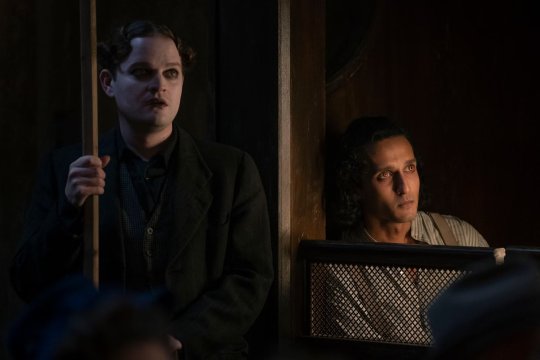
-- is quite something. You have both the writer and director for the Théâtre des Vampires not on stage for this whole thing. Very much underlying the fact that this is a theatrical play that is being put on. As we saw, there was even a real, actual SCRIPT for this whole thing!
Like, how much more could the show have been pointing to what was really going on here? Trust a writing staff of playwrights to be meta about all of this. 🙃
Because the ending of this trial was written and locked in long ago. And who is the one that usually says when a play or film is locked in and finished?
The Director. (And yes I know producers and studios do too, but Armand is very much all of that wrt his role for their little theater as well).
BTW, Santiago and the coven did NOT expect Armand to do that to the audience. Saving Louis was very much off-script. And if Armand really had no power here, the coven could have just taken Louis off stage and killed him another way. The only reason they didn't was because Armand was very much not powerless in all of this.
Like, I love Armand's character, I really do -- now. But that is something that only came about after I read the books from Queen of the Damned forward. For the first two books, I very much did not like him. And, particularly when it comes to the Paris part of this story, that is where we are with his character right now. I know why he's doing what he's doing, I understand it. But I can't defend it.
Louis probably figured things out before San Francisco in 1973. He probably knew Armand's full role in what went down, same as in the book, after it all happened. But it was his suicide attempt that had Armand redact that knowledge from Louis' mind. The clues for that being the case are all there after episode 2x05.
Because, at the end of the day, even knowing Armand's full role in Claudia's death, Louis still mostly blamed himself for it all.
As we see, things are slowly starting to come back to Louis, but he's not fully there yet. And I think this whole memory thing is a more literal interpretation of the veil that descended over Louis' mind after Paris in the books.
A veil that only began to lift once Armand revealed to Louis that Lestat was alive. As we've seen, Louis knew Lestat was alive back in 1973. I'm not sure if he does so now. But maybe this isn't about knowing if Lestat is alive or not. Maybe it's just Louis thinking he needed to be punished because of his own role in failing Claudia -- and staying away from Lestat was part of that self-punishment. Because that view is a feeling I got when watching episode 2x05 and Louis not wanting to speak to Lestat. His refusal to speak wasn't out of anger IMO, but more fear and even sorrow.
The show is very much sticking to the beats of the book with all of this, and not revealing things about what happened that were revealed in later books. So I don't think Louis fully knows what was going on with Lestat during that trial. I wouldn't be surprised if we learn he still doesn't, since he never learned it in the first book.
But as I said here, it was clear as day that Lestat wasn't himself during that trial. Physically and especially mentally. I didn't even guess that the show would be that obvious about it, but they were. All very much hinting about what was really going on with his appearance here.
And Louis himself might, just might figure that out for himself. Especially if Dreamstat might appear to be back in his mind again. Because Dreamstat is very much Louis' subconscious. And I think Louis' subconscious knows something important is missing wrt all of this.
It was nice that, at least in the end, someone chose Claudia. Madeleine could have escaped this but chose to die with Claudia instead when she didn't have to. Her little middle finger to the crowd gave me a smile.
They did not do the full reveal of Claudia's diaries and what was in them on stage, which I seriously thought they would. They gave a hint about it, but more so in episode 2x05 than in here. Which means that, in a later season, we're still looking at that reveal from Merrick happening it seems. But then again . . . there were some things I suspect got left out on purpose because the actual (attempted) murder of Lestat was very much glossed over for us, the audience, during that trial sequence. We are very much set to revisit that whole thing during The Vampire Lestat adaptation in Season 3, of course. But I think even more will be revealed about that there then I originally thought.
And finally, Claudia. They said in the Inside The Episode they wanted her to go out with as much strength and defiance as she could and yeah, she did. But in the end, I still think she was angry, sad, and hurt by it all, which she had every right to be. Because at the end of the day, she never should have been made and was made for all the wrong reasons. But being turned so young made her a fierce and pure vampire though and though because she never had enough time to have lived a human life to have those types of morals and outlooks fully imprinted on her. That was always one of Claudia's core traits wrt her being turned so young, and she still had it here. And yes girl, you will haunt things after this -- particularly your parents.
In fact, it probably very much was your voice Louis heard calling him back in 2x05, wasn't it?
So, for a penultimate episode, this was very, very good. And things are very much going to explode next week. I knew Louis going Carrie/Firestarter on the coven would happen in 2x08. That moment always screamed "season finale" to me. Santiago picking up Claudia's yellow dress is also significant, as I think we'll see Louis' POV of that moment with Lestat about it.
And the break up between Louis and Armand might just be much more violent than it was in the book as well.
#Louis de Pointe du Lac#Armand#The Vampire Armand#Lestat de Lioncourt#Claudia#claudia de lioncourt#claudia de pointe du lac#Daniel Molloy#Loustat#Loumand#Interview with the Vampire#amc iwtv#iwtv#iwtv spoilers#iwtv Season 2 spoilers#iwtv Season 2#iwtv Season 2 speculation#vampire chronicles#the vampire chronicles
234 notes
·
View notes
Text

3x02 Eclipse | Nightmare
Stay with me on this one: I don’t think Marcus Ellory ever shows up to his mother's grave in Eclipse.
As truepenny points out in her typically-brilliant meta, Eclipse is written in the style of the Greek theatre's katabasis, a journey to the Underworld (followed by anabasis, the return to the world of the living). You've seen Hadestown? You've seen a katabasis.
This is another playwright John Krizanc joint, and as other people smarter than me have meta’d, Ray’s katabasis sees our hero venturing to the Underworld (a literal graveyard/crypt/grave); solving the riddle presented by the Underworld's guardian ("There. Now it's broken and it's working." "Good man."); learning a fundamental truth about the cyclical nature of life or undergoing a symbolic death of the past self; and then returning to the land of the living as a new or newly-knowledgeable person.


Ray Kowalski is tormented by Marcus Ellory as a symbol of his life up until this point. The two defining features of Ray Kowalski's life up until he meets Fraser are 1) Stella, and B) being a cop. "The point is, I mean, my whole life, it all starts and ends with this one guy."
But that part of Ray's life is over.
To make this a metaphor for queerness (as someone who personally married a man before coming out as a lesbian around Ray's age), in our mid-30s we're often forced to deconstruct the narratives of our lives that we've been so devoted to until this point. Have we been living for ourselves, or for other people? Has doing what society expects of us made us happy?
If you're closeted, the answer is usually going to be no. And that means you have to burn down your entire life to start fresh (the house, if you will). It means you have to grieve your past self—the one who had a heterosexual spouse and a house in the suburbs and did what society expected of you—in order to make room to rebirth your authentic self.

In the Underworld, and in the graveyard, Ray buries the man who wanted a wife; the man who wanted revenge on Ellory; the man who was a con job.
He's revived a man with a new partner, no longer motivated by vengeance, and who knows he's a damn good cop because he is.
So now that we've established all of that, let's get back to Ellory.
Ellory doesn't show up for his mother's funeral; by the time the mourners are leaving, he's still not there. "You know, Ray, I'm pretty sure he'll come," says Fraser, at 4:30PM. "We have time." But after Fraser gives Ray his own history back to him, Ellory still hasn't showed. They decide to leave, and Ray throws his dream catcher to the wind... where it's caught by Marcus Ellory.
"It's a dream catcher," says Fraser. "It tangles up bad dreams."


It tangles up bad dreams.
Ray puts on his glasses; he can't really see Ellory clearly. Then, once they end up together in the grave, no one else ever sees them. Fraser never sees Ellory. By the time Ray is reborn anew after the eclipse (literal darkness into light!), Ellory is nowhere to be seen. Suspicious!

I think the casting choice here, too, is deliberately made to make Ellory an allegorical figure as opposed to a literal one. Peter Bray, the actor, is 6'7". He's huge, and lying in the grave next to him, Ray looks even smaller than usual.
That's because we are seeing Marcus Ellory the way twelve-year-old Stan Kowalski would have. Huge, imposing, feet taller than him; essentially a cartoon villain. Ellory is exactly the same here as he is in Ray's memory, unchanged but for a little grey, even though twenty-three years have passed.
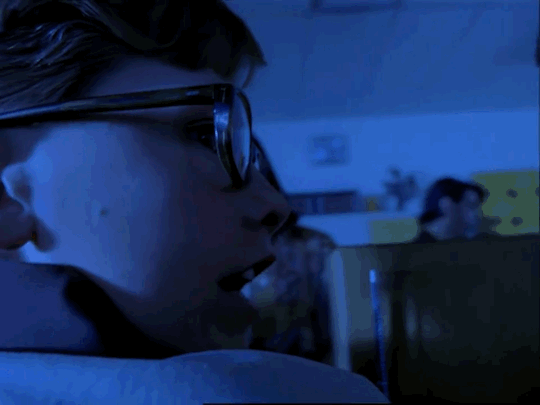

And then he disappears.
Ellory is the final boss of Ray's katabasis, his eclipse-fueled nightmare, tangled up in and cleansed by the dreamcatcher Fraser made him—just like Fraser's recitation of Ray's citations tangles up and cleanses Ray's own poor consideration of himself.
But it’s not about Ellory, y’know?? It has nothing to do with Ellory, not really, and everything to do with Ray’s own perception of himself and the story he tells himself about his own life. In this way, I think it’s more powerful a read if Ellory is not there; it’s all Ray. Just Ray, letting go of the man he thought he was and choosing to become the man he wants to be.
For me, Ellory’s just a bad dream. He’s a larger-than-life demon of Ray’s own making. He’s probably in hiding or dead, but Ray doesn’t actually need the real Ellory to exorcise that demon. He just needs the right angel.

Ray Kowalski dies and is reborn (like due South!), at the end of what I consider to be the two-part opener of Season 3.
Happy 27th birthday, Eclipse (Sept. 21, 1997)! You're one of the all-timer episodes of TV.
#due south#benton fraser#ray kowalski#fraser/rayk#otp: there's no ships like partnerships#fraser/kowalski#my gif edit#paul gross#sammaggs gif edit#maggs due south meta#3x02 eclipse#i know this is an insane amount of words for a tumblr post#but i'm taking this shit very seriously#apparently#this is what i'm doing instead of going back for my phd apparently
76 notes
·
View notes
Note
lotus! I need some of your favourite 14/river fics, or honestly any of your favourite river/doctor fics!! I wanna get into my hyperfixation again in time for the Christmas special!
Ana 💕
You, Ana, have opened the pandoras box (aka my bookmarks) with this ask. This could become a bit long because a. I am a chatterbox, and b. I have little to no idea what your fic preferences are, so I'll just recommend you a bunch and hope that my taste in fics at least vaguely aligns with yours. Here we go:
*= Smut
°= Fix it
14 x River:
*This phantom life sharpens like an image (but it sharpens like a knive) This is the perfect fic. It isn't finished yet, and I'm honestly not sure anymore if it's a fix it or not, but it is great.
°In thee I delight A sweet little outsider!pov fic. Just something nice for the soul.
°It must be light wherever you are More of a multi-Doctor fic really (not at once), but there's some fourteen at the end.
13 x River:
°I'm Alive A short trilogy for when you need something funny and sweet.
°Love is not an emotion, it's a promise Again, multiple Doctors, but mainly 13. The Doctor refers to River as their 'little goddess'.
°5 Times The Doctor Talked About River Song With Graham (+1 Time The Fam Finally Met Her) It's in the title really. Very emotional. (Not as in sad necessarily, there are simply a lot of emotions).
°i am the distance you put between all of the moments that we will be Very lovely fic. Angstier than I thought tbh. So definetly something for when you want pain and longing. Has a happy ending though.
°You Know Who You Are and Yes You're Gonna Break Down This one's fun. They flirt, they dance, the Doctor's being gay... a bit of angst towards the end, but it gets resolved rather swiftly.
Of Handcuffs and Custard Creams Pure hilarity for when you need something to laugh about.
°she's got a smile that heals me Fix it happiness with a dash of angst and yearning, very sweet.
understanding I'm not sure how to describe this one. It is not necessarily Yaz bashing, it's just a lot of unrequited love. Very nice for when you're feeling vindictive after having to guess on every second fic on whether or not they're going to have the Doctors and Rivers marriage be open to sprinkle in some thasmin.
12 x River:
she blows out of nowhere, roman candle of the wild Human Au. Twelve is stood up on a date and River saves him. Banter and love at first sight ensure.
The Playwright and his muse Human Au. Twelve is a playwright in victorian(?) England, River Melody becomes his muse. A beautiful trilogy.
*But she prefers two lumps of sugar and tea Human Au. Twelve is the most grumpy barista that the world has ever seen, River does not put up with it. He immediatly falls in love, yet continues to be an idiot.
°Are we dancing after death, you and I? River gave the Doctor her regeneration energy, he becomes downright addicted. Angst, yearning, sweetness.
°I use the stars to find you This is just fluff and sapiness and domesticity. Like a long, warm, comforting hug.
*And if I get burned, at least we were electrified Sweet, hot smut. Twelve grows a beard.
*The voice of your eyes is deeper than all roses River has a praise kink. Very hot, and more emotional than it sounds. (Again, emotional does not mean sad. It just means... emotional).
Writing between the lines Have you ever wondered what elevens regeneration would've been like with River around? Well, wonder no longer! Here it is.
11 x River:
*°And all in war with Time for love of you The very first Doctorriver fic I ever read. A beautiful fix-it fic.
*though my eyes stare inward now at where you were Such a great fic. I won't spoil much because the riddle of it all is half the fun the first time around (for me it was, at least).
°Hold infinity in the palm of your hand The Doctor and River post dying. Very fun, very sweet. They're just so married (literally).
*heart swells like water A rewrite (or write along?) of 'Day of the moon' that fills in all the smutty gaps.
gazing into the abyss The Doctor has the last of the Mr. Clever residues fucked out of him by River. Very hot. River literally manages to seduce a robot. Not that we ever doubted her capability to do that.
To force them apart This might very well not be your cup of tea. I have a weakness for dark!Doctorriver.
°moved from day into night to be near you Steven Moffat had a very specific vision of how he wanted River and the Doctors story to end completly. This vision is sadly not canon. This vision is this fic.
Sharing Names This fic is amazing. It forever ingrained the headcanon in me that time lord names are telepathic.
Accomplice A fun little drabble. Hints of dark!Doctorriver.
a love that even time will lie down and be still for This one is so sweet! The Doctor is everything little Mels wanted in a partner.
and i'm thinking 'bout how people fall in love in mysterious ways Human AU. River is very much in love with one John Smith. This one has a bit of everything. Fluff, flirting, angst...
10 x River:
*competition This one's a (very hot) revenge on the Doctorrose shippers who put works in the Doctorriver tags that are very mean to River. Maybe not your cup of tea.
9 x River:
°*Where I've been It's been a while since I've read this one, but I remember that it was incredible, so there's that.
Worth living for River helps the Doctor heal after the time war. Very sweet, if I remember correctly.
Multi-Doctor x River:
All in Your Head There are three Doctors (+ companions) in the TARDIS at once. River decides to be a telepathic tease. Very, very funny.
°Glad We're Here This is one of the funniest fics I've ever read. There are two Doctors (technically three, but thirteen misses the main action) and two Rivers. Lot's of timey wimey shenanigans ensue. It is so funny.
°*There is a love I reminisce This fic is wonderful. It includes eleven and eight and mentions a lot of the Doctorriver encounters featured in the audioplays. I'll admit, the ending somewhat confuses me, but that's probably nothing that couldn't be fixed with a reread. Lots of timey-wimey stuff.
Energy for a lot of words, but not for a long story (Oneshot collections):
The myth of us never ends 100 stories
You taught me how to love when nobody ever could 15 stories
It's called Marriage, Honey 70 stories
Recommended Authors for even more fics:
Del (godessdel) Their writing is just beautiful. Everything they write is so beautiful.
flowingtune Has great story ideas. Also writes lots of thoschody, if that is your jam. Lots of timetots.
mygalfriday (BrinneyFriday) So. Many. Great. Au's!
melodypond_thewomanwhomarriedme (sexymonk) Has lots of fun stories and Au's.
HellNHighHeels I had one fic of the bookmarked and just checked them out to see if I should put them on the list. I haven't read much of them, but their stories sound like great fun.
TheWifeofRiverSong If you ever feel like reading the hottest smut, they're the author for you.
hihoplastic Their fics are good. I never noticed just how many Doctorriver fics of theirs I have in my bookmarks until now.
#I am so so sorry this took so long#It was a mixture of laziness and stress#and I may have slightly overdone it#ah well. This should keep you covered for a while xD#I'll probably add to this at one point#when there are even more fics and I've gathered even more favourites#despite what one should think those aren't all of my bookmarks#fanfic recs#lotus chatters#ask#asks#bubbletune6#doctorriver#doctor x river#the doctor#river song
33 notes
·
View notes
Text
Roger Barel Main Route - Chapter 13 His POV

As usual, can’t guarantee 100% accuracy on this. I’m doing this for archiving purposes and you can probably find a better translation out there.
(He wanted to eat the person he liked…?)
In this case it wasn’t a euphemism for love, but literally that dead man’s intent.
Roger: —Could it be that…
His cursed sin is…cannibalism?
(I’ve never Cursed One with cannibalistic urges. There’s no past data. But…)
But when you think about everything that happened—It all made sense.
(That guy…was really Cursed)
He didn’t know he was Cursed and didn’t know that his urges were from his cursed fate. He died blaming himself.
(Ah, it happened “again”. I…led another innocent “Cursed One” to their death…”again”.
Roger: “‘Cursed One’s’ tragic fate can’t be altered. In the past, there have been no exceptions.”
That’s so true, it makes me laugh.
Kate: Um, Roger…
???: Hey, hey. A man dressed in all white with a nice smile and parted bangs just told me something.
You were talking about the murder from last night.
(...?)
I turned around and saw a stranger leaning against the counter with a smile.
Kate: And you are…
Nicholas the novelist: Just some insignificant novelist called Nicholas. And these are…
Michael the playwright: Michael, a playwright.
Joanna the caricaturist: Joanna, a caricaturist.
Barkeep: Ah, these three are people of culture who are regulars here. They like to stick their noses in other people’s business.
Nicholas the novelist: We have to! We’re always looking for inspiration for our works.
Man tries to eat a girl with red hair. It’s like the wolf from Little Red Riding Hood.
Joanna the caricaturist: Don’t lump this together with a childish fairytale like Little Red Riding Hood. It’s an insult to a sensational incident.
Michael the playwright: A bloodstained girl and a man standing over her in shock. Aha, I have an idea!
(...Ah, I see…these guys…)
The reason why they came to be known as “Fairytale Curses” is because of novelists, playwrights, and the like who created works based on existing “Cursed Ones”.
But nowadays, the relationship’s been reversed and they’re referred to as “Fairytale Curse”.
My curse is the Double-Crossing Hunter.
Elbert’s the Greedy Queen, Alfons the Mirror.
The reason for these names must have come from Cursed Ones that lived before us.
Tonight, another fairytale would be born from a Cursed One.
(I know people are free to create what they want and no one can fault them for that)
(—However)
Michael the playwright: I hope more tragic incidents happen. That way I can create the best stage performances!
Nicholas the novelist: More material for our works! Haha, just kidding!
Next thing I knew I was slamming my mug down on the table as if to cut their laughter off.
Roger: They didn’t die to be a spectacle for you lot.
Michael the playwright: Ah, erm…
Nicholas the novelist: Um…We didn’t mean to make fun of people’s deaths.
Joanna the caricaturist: That’s right. Just having jokes at a bar.
I heard voices repeatedly try to defend themselves within my distant consciousness.
I was already well aware that the “sinfulness” of “Cursed Ones” couldn’t be understood.
That’s why they’re “curses”.
Roger: —Just kidding.
Michael the playwright: …Huh?
Roger: You were starving for stimulation, so I thought I’d surprise you.
Michael the playwright: …Wha
What the heck! You scared me!
Roger: Ahaha, sorry.
Michael the playwright: That performance was so real. Want to join my troupe?
Nicholas the novelist: You can scout later. Let’s have a drink as thanks for surprising us!
Roger: Yeah, sure.
They’ll never know what we “Cursed Ones” mourn over or what’s fated ends are.
So I just pretended that nothing happened. This “acceptance” was a technique I took up to get by in this world.
—However, there was one person beside me that didn’t agree with this acceptance.
Kate: Roger…
There was a hint of anger in Kate’s voice and disapproval in her eyes.
(...Kate, you’re too nice. You’re the only one willing to stand with the Cursed)
Kate was a kind person and now held feelings for the Cursed, Crown included.
That’s why there wasn’t a need to feel worried or hurt anymore.
Roger: Hmm?
I downed my beer and ruffled her hair like usual.
Kate: Stop…
Roger: We heard what happened. The investigations’s over so there’s no point in digging any deeper.
Kate: I don’t think that’s how you truly feel.
(—Yeah, you’re right, Kate. It’s not…how I truly feel)
When Kate wasn’t looking, I went outside. The rain poured down relentlessly, but I didn’t care.
Alone, pitch-black despair that I’d been holding back starts creeping up from beneath my feet.
(If we told Lance “you’re a Cursed One” back then, would things have changed?)
I could imagine all the what-ifs I wanted, but the dead never return.
~~

My dear little friend, you will no doubt encounter despair in the future. However, don’t let yourself be defeated.
~~
I remembered the words of a dead friend, words that I’ve repeated over and over.
(...I’ll be fine. I won’t let despair consume me)

(I’m strong, I won’t be defeated, I won’t be lonely, I won’t let my soul rot, and…I’ll fulfill my ambition)
(That’s why I’ll be fine. …I’ll get back up and continue like nothing’s happened)
(I still don’t know if there’s a shadow watching over me)
And that its existence will save me.
Next
84 notes
·
View notes
Text
I saw a post recently with someone saying they couldn't believe we were actually right about Harrow being put in Pip and escaping his death because I guess the show finally decided to wrap up the thing they very blatantly set up, which ok so first of all:

But then the OP said they'd thought it was one of the more far fetched theories from Season One and I just...
Far fetched??
F A R F E T C H E D????
F a R f e T c H E d????????
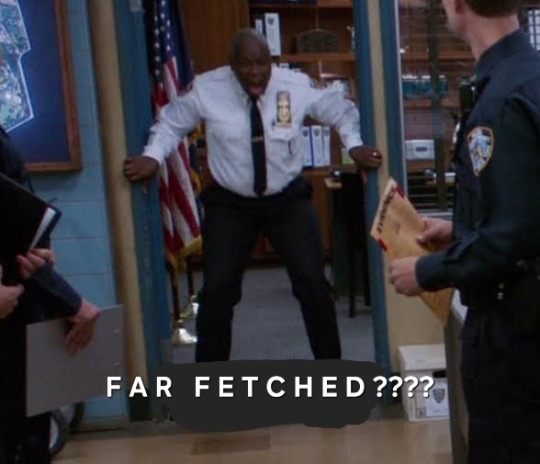
...Uh huh...
Ok.
Let me teach you something about media literacy, because it's apparently been dead for a while.
This is a double-headed soulfang serpent.
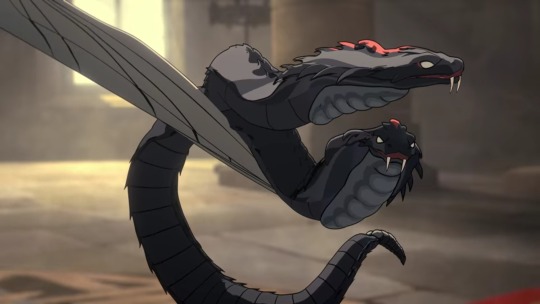
It's VERY PROMINENTLY introduced in Episode Two. Viren teaches us about it through introducing it to the other characters, who are until that point unfamiliar with its existence. There is no reason to have an entire scene dedicated to it if it won't become important later.
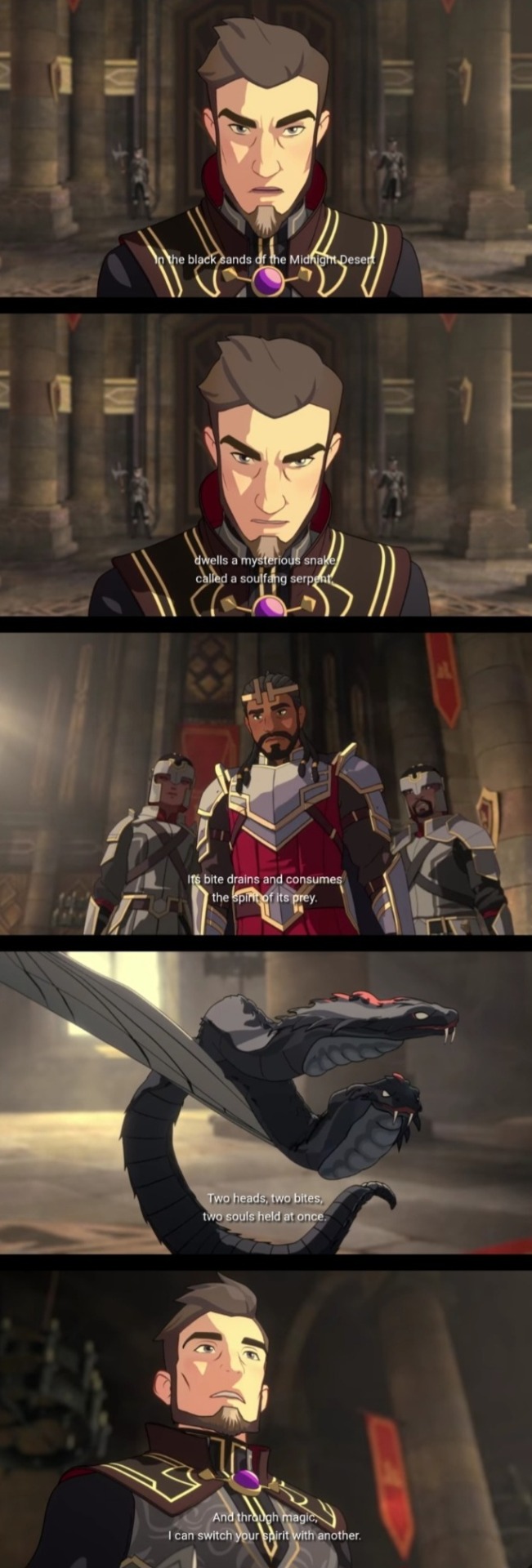
This is called a Chekhov's Gun. In Stagecraft and play writing, this is referring to a rule laid down by Anton Chekhov, a famous and excellent playwright who is most known for teaching that if a gun is prominently displayed in a scene which otherwise didn't need one, then that gun had better by fired by the next act (I personally believe it's ok to fire whenever so long as it's done before the story ends and is relevant to the plot). This has been a base rule of visual storytelling and building audience expectation for a long time.
Let me break down for you how they continued setting up this Gun and executed its full establishment including Pip's part in it throughout the set up episodes of Season One.
That's a very prominent well-drawn gorgeous bird being focused on by the 'camera' for seemingly no reason in an animated show which needs to focus only on important things because animation is fucking expensive... Then that bird sure is very frequently placed on that prominent character's shoulder...
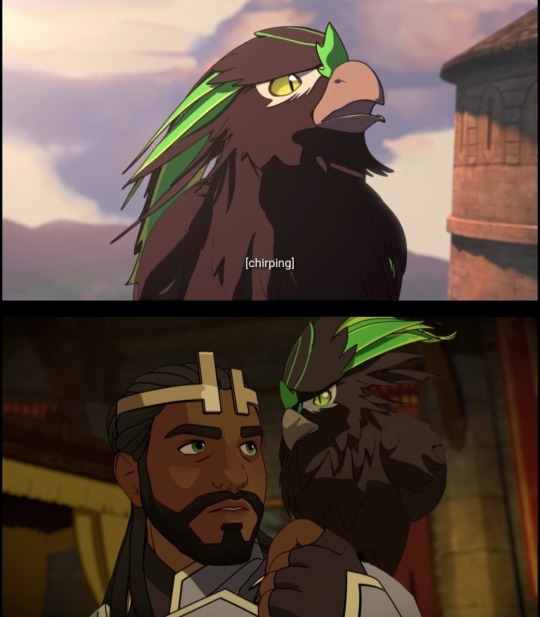
Damn. I sure hope plot relevance doesn't happen to this very prominent bird and very prominent fucking snake Viren BRINGS INTO THE BEDROOM WITH HIM BEFORE THE ATTACK.

OH LOOK WHO ELSE IS THERE IN A FOREGROUND SHOT FOR SEEMINGLY NO REASON. Gee, I wonder why the animators CHOSE to put Pip in frame in a very otherwise unconventional and unnecessary way if it didn't have the purpose of subtly reminding us he's there???? Why would they need to keep nodding to that???? I wonder why he's so damn important????
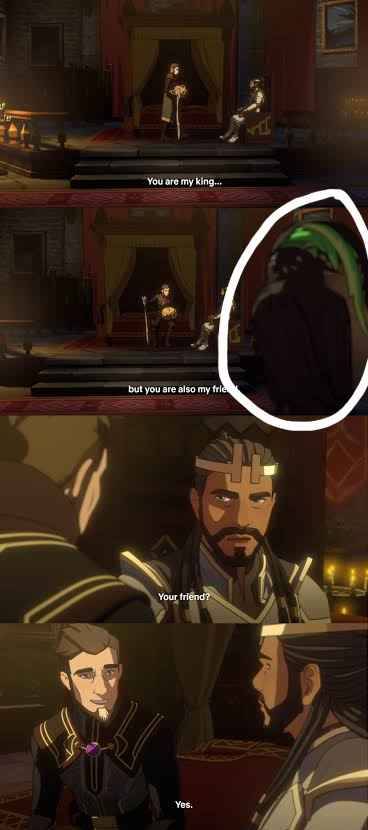
Oh hello Pip you sure are right there in reach next to Harrow right at the pivotal moment of this very heated argument about dark magic and Viren's place in the pecking order. Sure would be awful if, say, an increasingly hurt and angry powerful dark magic practitioner threw a
DOUBLE-HEADED SOULFANG SNAKE
at you within the next minute in a fit of rage...
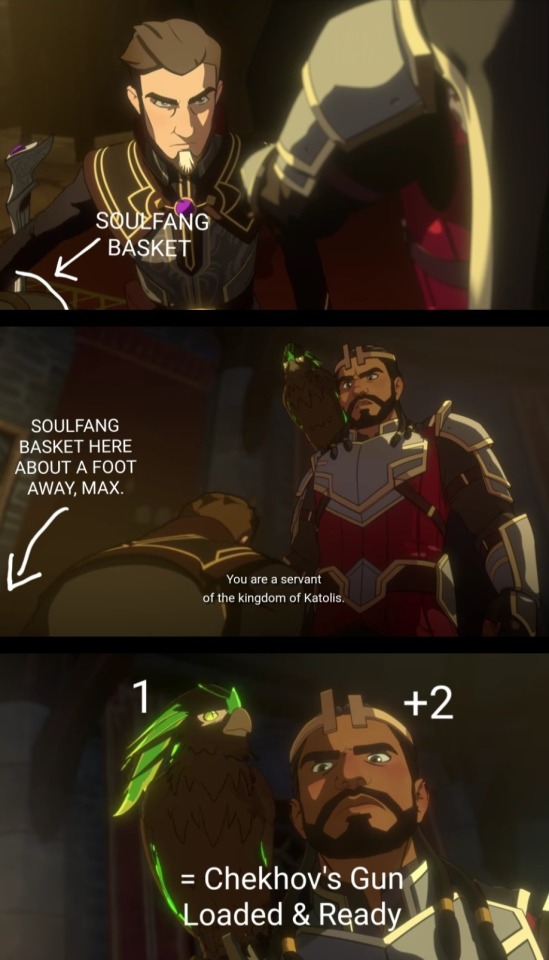
AND THEN
Viren talking to Pip just before his coronation like he's gloating at a fucking bird for some reason while the SONGBIRD DOES NOT SING is RIGHT FUCKING THERE. That sure is a significant amount of time spent on Harrow's weirdly prominent pet bird. Damn, that sure is a lot of beef to have with a fucking bird, Viren. I WONDER IF MAYBE THAT ISN'T PIP AT ALL???? WOW. WHAT A WILD THOUGHT.

Pip BEING AROUND AND PROMINENT BEFORE THE ATTACK and then going missing later in the story after we've established Ezran can fucking talk to animals is RIGHT FUCKING THERE.
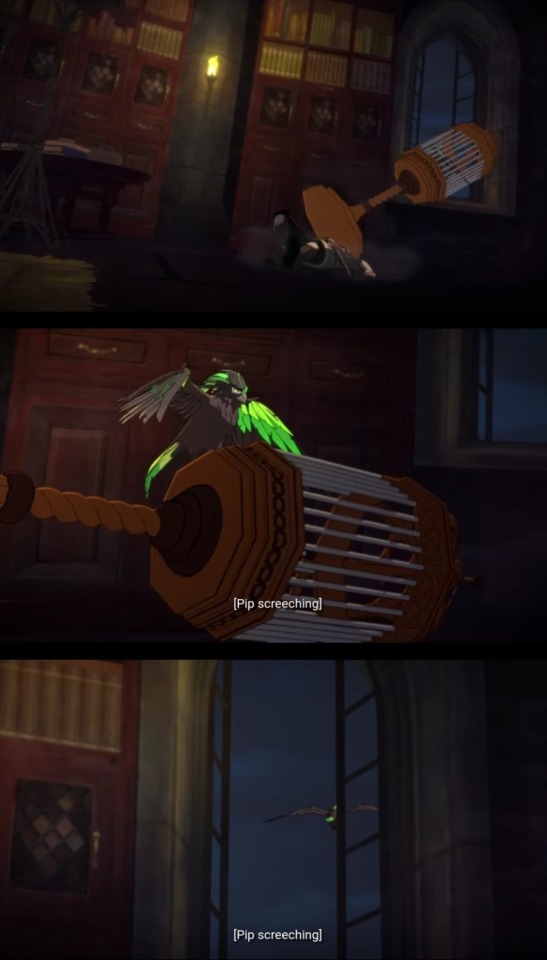
The reason why we called this all the way back in Season One is because it was BEAUTIFULLY set up by whoever actually knew how to do visual storytelling and write well on the show before I assume they got fired and Season 4 dropped and caused me physical pain trying to watch it hammer shit hamfistedly into our heads like we're all 3 years old or something.
One of the reasons media is bad now is that things like Chekhov's Gun, along with numerous other basics of story writing, have been thrown out the door with all the expensive experienced writers who capitalist dickheads didn't want to pay/any new people coming in who do care but who don't get the room to actually learn and execute this stuff because we always need to have the next new thing out the door yesterday regardless of its quality or lack thereof. And as a result, way too many audience members aren't developing and maintaining media literacy and then complaining when they don't get spoon-fed shit because that's what they're used to, so writers are instructed to dumb it down even further and hit you over the head with shit like "Oh I can't believe it's been T W O Y E A R S! (No one could tell just by the fact everyone is clearly older and there's no way we could do this stupid retcon in some less hamfisted way elsewhere with more nuanced imparting of that information. Shove it in and hope they don't care. Quick, distract them with a fart joke!!)"
'Far-fetched.'
Jesus christ, this hurts my fucking soul on so many levels.
We're not smarter than you, we just fucking pay attention and then get a hammer to our skulls for our efforts because whoever fired the good writers and wouldn't teach the new ones/didn't know jackshit about the most basic writing rules themself decided not to trust their audience anymore to have the intellectual capacity and attention span of at least a 10 year old. Something something, self-fulfilling prophecy apparently.
(I'm trying to do a compromise of not being a dick while still getting to express my frustration at OP over this by keeping it away from everyone who wouldn't want to see this so I don't rain on their parade/be mean to that OP on their post. Don't come at me if you like the show to the point you can't handle people criticising it or having strong opinions about people not knowing the most basic shit as an audience member anymore. I made my own post and didn't put it in the main fandom tag/tagged it as criticism for a reason.)
#tdp critical#tdp criticism#the dragon prince critical#the dragon prince criticism#writing#media literacy#visual storytelling#chekhov's gun
40 notes
·
View notes
Text
literally what do you MEAN the coyote got run over offscreen and the roadrunner is alone and left unchased!!!!!!!!!!
#mumbling to myself death is random and meaningless death is random and meaningless the world is disrupted quietly no one knows what to do#the story cannot progress there is a story beneath the story. There is no one to tell it what to do#everything is unfinished and empty a life that never got to be fully written except it did but how could that be it???#and then it does a little dance!!!!!!!#WES ANDERSON IM GONNA KILL U WITH A MAUL WHAT THE HELL#this is the saddest movie ever made guys im crying voer a roadrunner#im not doing it right!#everyone is dealing with loss they're all alone and they have to perform their roles and they cant and they dont know how or why#this is a love story this is a death story this is a story story#GOT RUN OVER. OFFSCREEN. LIKE. THE PLAYWRIGHT?#the playwright who gets run over offscreen?????????#he predicts his own death a hudnred times over. The. the#how am i supposed to wait for saturday i need to see it again neowwwww#haunted ghost movie!!!! but haunted in a calm and slightly hopeful way#death isn't scary the alien isn't scary. he's just there. he's gonna take something from you and you're gonna feel like#the world is upside down and on fire and scary and you're not gonna know what to say. but it wasnt personal. It didnt mean anything really.
23 notes
·
View notes
Text
Intergenerational Trauma Challenge - 180 Degree Longitude Passes Through Us
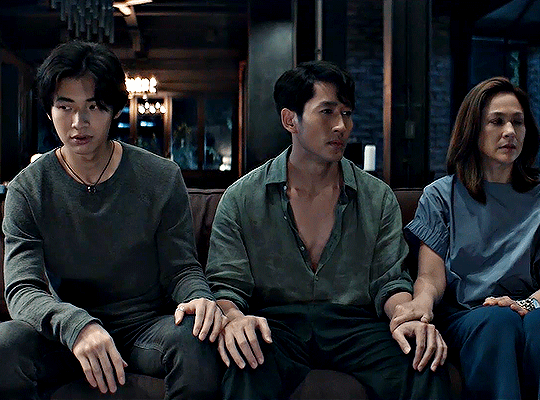
It’s winter and I’m huddled up in my house hiding from the cold weather, so obviously this is the perfect time to tackle another entry on the intergenerational family trauma challenge list. This week I finally watched 180 Degree Longitude Passes Through Us, a Thai drama about Wang, a young man just coming of age who is desperately seeking answers about his father’s death; Sasiwimol, Wang’s very complicated mother who does not want to dig up the past; Inthawut, his father’s best friend who has been hiding from it for years; and Siam, the black hole at the center of this story.
Before I dig into the trauma themes, let me just say that this show is excellent, if not for everyone. It has a very intentional style that makes it feel like a stage play—the writer is a playwright—and it’s basically eight episodes of very intense conversations. It’s not a romance and there’s an intellectualism in the writing that I found kept me at an emotional remove from the characters even as I marveled at how well crafted the dialogue is. And the dialogue is very important, which is why the translation of this drama is much stronger than we typically get from Thai productions—the words matter. It’s also loaded with visual metaphors and is all around beautiful to look at, and the three main performers are fantastic. I highly recommend it to anyone who likes theater, stories about complicated families, or beautiful and talented actors showing their work. And more than anything else, this show does incredibly strong thematic work and its messaging is on point: this is a story about how noble idiocy ruins lives.
So, with that said, onto the trauma! Spoilers ahead, and I am assuming anyone reading past this point has watched the show. Some themes you’ll see in this one: taboo, denial of queer identity, homophobia, filial piety, and lots of emotional manipulation. Shoutout to @bengiyo and @twig-tea for reading this to make sure I didn’t miss anything in this complex story.

There are two main sources of intergenerational trauma radiating down toward Wang: the absence of his father, Siam, and his intense relationship with his mercurial mother, Sasiwimol. The story is structured around Wang’s determination to seek answers about Siam—both who he was and how he died. He has grown up knowing a certain story: that his parents met and fell in love in college but divorced when he was young, that his father loved him very much despite not staying with his mother, and that his father was an alcoholic who died in a drunk driving accident. Shortly after his father’s death, his mom put him in boarding school so she could focus on her career and became a weekend parent to him—as she was not around to structure his day to day life, their relationship became more about her taking him on fun adventures and spoiling him when she had time off, treating each other as best friends instead of like a mother and son, and never talking about Siam. He has always suspected there was more to the story of his parents that he was not being told, and as he has grown up, come into his own queerness, and picked up on his mother’s casual homophobia and obsessive devotion to compulsory heteronormativity, his suspicions about the secret his mom was holding became sharper.
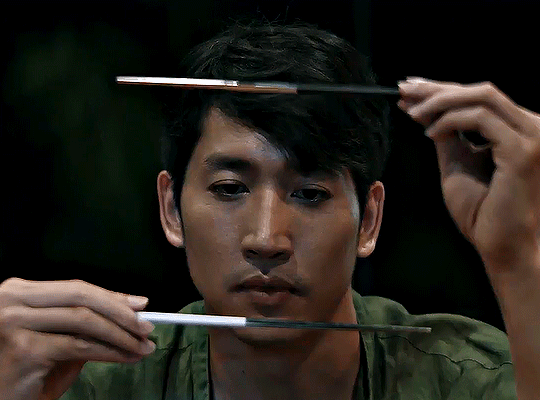
Enter Inthawut. Inthawut was Siam’s best friend, and with nothing to go on but a set of old pictures, Wang has an instinctual certainty that he is the key to the secret he’s seeking. And thus he engineers a way for he and his mom to “coincidentally” stumble onto Inthawut’s property and get invited to stay a few days in his isolated home, at which point Wang begins his campaign to figure out what the hell happened between Siam, Sasiwimol, and Inthawut at any cost.
One of the things I find most interesting about this story is how much the plot hinges on Wang going against Asian cultural norms in his pursuit of the truth. He is not respectful to his elders. He does not maintain filial piety and deference to his mother. He refuses to restrain his emotions. Instead, he is pushy and relentless and emotionally manipulative (all tricks we can plainly see he learned from Sasiwimol) and Inthawut doesn’t stand a chance against him. And so, because Wang explicitly acts against these cultural values, the truth comes out and the trauma is no longer suppressed.
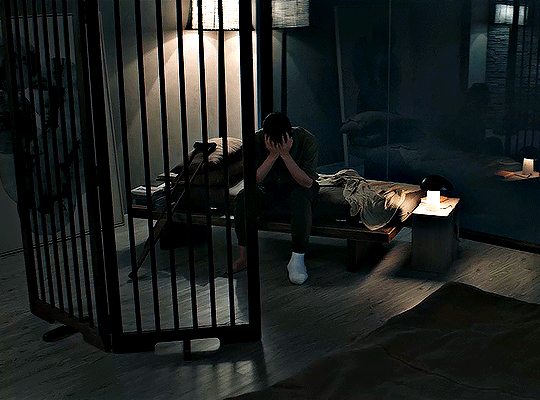
And in the end, it’s a simple, if desperately sad story: Siam and Inthawut were in love, but Inthawut was battling internalized homophobia and deep-seeded fear and so he relentlessly pushed Siam away and toward dating and then marrying their friend Sasiwimol. And when Siam, miserable in this heterosexual relationship he never actually wanted, finally snapped and confessed his true feelings, Inthawut rejected him and ran away to study abroad. Inthawut was running due to his own fear, but he also had noble notions of somehow protecting Siam from his own queerness and told himself that if he was gone, Siam would accept his heterosexual life. Of course, that did not happen, and in the fallout of this rejection Siam sank further into alcoholism and died soon after. Inthawut’s reaction was the exact worst fear of all gay people who work up the courage to confess to a friend they have developed feelings for: outright rejection, abandonment, and destruction of the relationship. And in his mind, he did this to Siam “for his own good,” a fairly textbook execution of the noble idiocy trope. In the aftermath, we see how Inthawut has isolated himself, part in penance, part in self-protection, and intellectualized his way to a romantic construction of his own cowardice that he tries to convince Wang is righteous.

But Wang is deeply affected by how the denial of his father’s queerness ruined his life and is absolutely not having any of Inthawut’s self-denying bullshit, and this is where things get messy, as both Wang and Inthuwat seem to start seeing Wang and Siam as interchangeable and they develop an emotional entanglement that is deeply unhealthy, to say the least. Wang wants to understand Siam so badly that he starts to be him, and Inthuwat is so desperate to address his regret and shame that he starts to see Wang as Siam, as well. Wang also uses this attachment as a way to shock his mother and forcefully bring her real feelings about Siam and Inthawut to the surface. Despite Wang’s many loud protestations to the contrary, I don’t believe that he and Inthawut actually love each other. They are using each other to work out their trauma about Siam.
And they’re not the only ones! Sasiwimol seems to have her own psychological confusion about Wang as he relates to Siam, and their dynamic is very strange as a result. She refers to Wang as dua-eeng (and has taught him to do the same with her rather than calling her “mom”), a Thai endearment that literally means “self” but is often used between lovers. They have a very physically affectionate relationship that often had me grimacing in discomfort, and she clearly sees Wang as both a source of pain—because he is so like Siam—and her one source of comfort and happiness. She is a successful woman by any standard, but she’s also desperately lonely, hanging on tight to Wang as her only companion in a way that often veers into overbearing, and deeply wounded by her past with Siam and Inthawut. It was through her own friendship with Inthawut that she pursued Siam in the first place, and she clearly feels betrayed not only by Siam, but by Inthawut, both for getting in the way of her relationship with Siam and for leaving them. Her feelings about both men are complex and the story never fully spells them out, in part because Sasiwimol never does. Determinedly not thinking about what happened between them is a big part of how she copes, along with sublimating her suspicions into homophobia, which she perpetuates quite intentionally in her work via production of heterosexual romance propaganda.

Wang clearly loves his mother even as he is frustrated by her prejudices, her desire to control him, and her tendency toward emotional manipulation. He is a perceptive kid and he has studied her closely; he understands her very well and can often predict exactly how she’ll react to a situation. Which is why his decision to announce baldly to her face that he is in love with Inthawut—not only coming out as gay but declaring his intention to move out of her home and in with a man 20+ years his senior who is deeply entangled with her own trauma—felt very intentional to me. He knew what kind of reaction that would get from her, and he wanted it. And sure enough, Sasiwimol crumbles at this repetition of her trauma and the perceived disloyalty of Wang choosing Inthawut over her just as his father did. The rest of the emotion she’d been holding back comes pouring out, resulting in the three of them finally airing out everything that lies between them and everything they are feeling about the Siam-shaped hole in their lives. And once she breaks down, Wang is able to forgive her for the grievance she’s caused him and ultimately decides to remain filial and continue living with her, because he does not actually want to punish his mother for what happened to his father.

So, in the end, where did the story leave us with all this trauma? I can’t really say that any of these characters have healed, but I do think Wang kick-started that process, at least for himself. He got what he needed most out of this little scheme: deeper understanding of who his father was and why his life took such a drastic turn. He remains caught in the dysfunctional dynamic with his mother, and I’m not sure he’ll ever fully break out of it, but at least there is more honesty between them now about what they’re dancing around. She now knows he is gay and she has to accept it to keep him with her, and given that he has backed off from asking her to accept something much scarier than that, I do think she will find a way to make her peace with it. Inthawut is the character who seems to have progressed the least, standing firmly in his stasis and remaining determinedly alone with his pain, though the show leaves us with a note of ambiguity that suggests he may someday find the courage to move on.

The messages of this work are clear. Internalized homophobia and denial of your own queerness are poison for your soul. Rejecting a loved one “for their own good” is an act of cowardice and selfishness, not an act of love. Hiding from and sublimating your trauma will never allow you to heal. Refusing to process your pain will only lead to you pushing it down on the next generation. Ultimately, this story told us that bravely looking ourselves and our trauma in the face and confronting our truths head on is the only way to begin to heal, and that running from them only leads to ruin.
#180 degree longitude passes through us#thai drama#intergenerational trauma challenge#shan shouts into the void
156 notes
·
View notes
Text
Somewhere In Time is Literally Edwin/Charles, and here's why:
Just rewatched the movie Somewhere In Time because I thought it might work for a Paynland fic and holy fucking shit you guys it's perfect in every way. Charles is so Richard Collier coded and Edwin is so Elise McKenna coded it's not even funny. And the time periods are perfect???? Collier is literally from the late 70s/80s and time travels back to 1912???
Also William Robinson as the Cat King? Be still my beating heart.
(Spoilers for a movie from the 80s ig)
If you're unfamiliar with the plot, Somewhere In Time is about a playwright, Richard Collier, who, after being given a pocket watch by an old lady on the day of her death, begins to suspect that not only is it possibly to travel back in time, but he has already done it. He learns that the old lady used to be a beautiful young actress named Elise McKenna. He eventually manages to travel back in time, they fall in love only for him to accidentally get yanked back to the future just as they've begun to plan their life together. He dies from grief a week later and the two reunite in the afterlife.
Here are some scenes/dialogue that I think are so Edwin/Charles coded it hurts:
Collier (AKA Charles) decides to literally abandon his life and timeline after literally one (1) interaction with this lady + a pretty picture of her he saw in the museum section of a hotel and Charles would absolutely (and kinda did) do the same
McKenna (AKA Edwin) spent the rest of her life never giving up on finding Collier even though they were only together for a couple days. In her youth she's described as "quick and bright, fun, strong, and willful" but after he disappears she is described as "kind and thoughtful but too much within herself, like she was empty somehow" and you CANNOT tell me that does not sound like our favorite Edwardian boy
When Collier prepares to go to the past he picks out a time-appropriate suit, but when he gets there everyone keeps telling him its hella out of fashion and he is so offended 10/10, very Charles
I can practically hear Paynland saying this dialogue:
"Your occupation?"
“I’m a playwright.”
“A playwright.” (mad bitchiness in this line delivery)
“No, no I’m not here because of that!”
“Hm. And you say you know everything about me?”
“Well, yes.”
“Which is patently absurd. You couldn’t possibly know everything about me. We’ve never met. You’re a complete stranger to me.
“But then why did you ask, 'Is it you?'” (she asked this when they met the first time)
“I don’t have to answer that.”
“I know you don’t. I wish you would, though.”
When Collier asks McKenna to call him by his first name she hits him with the "Why should I?" and this doe-eyed fool says "I don't know. I just hoped you would."
Collier is terrified of the idea that McKenna would be afraid of him which is just so Charles like damn
When Collier tries to shave his face with the old-fashioned razor he does an absolutely terrible job, gets a bunch of cuts, and leaves shaving cream on his face and McKenna takes one look at him and decides this idiot is the man she's going to love forever
Their first kiss is actually the sexiest shit ever in this show like damn why they pulling up so hard in some random movie 40 years ago. ANYway when Collier touches McKenna's face and slowly leans in to kiss her she says in this breathy, barely heard whisper "Oh my God. I don't know what's happening." Which is very Edwin to me
When McKenna's manager gets too pushy about her romantic decisions she says "I am involved with you as an actress, Mr. Robinson. Not a doormat. Do not attempt to wipe your boots on me." okay Edwin
When McKenna is performing in the play (which is a comedy) she goes off script and starts dramatically monologuing all her inner thoughts about loving Collier while looking at him in the audience which Mr. "I know were in hell but I need to tell you I'm in love with you" Payne would definitely do
This is the monologue btw:
“The man of my dreams is almost faded now. The one I have created in my mind. The sort of man each woman dreams of in the deepest most secret reaches of her heart. I can almost see him now before me. What would I say to him if he were really here? Forgive me. I’ve never known this feeling. I’ve lived without it all my life. Is it any wonder that I failed to recognize you? You brought it to me for the first time. Is there any way that I can tell you how my life has changed? Any way at all to let you know the sweetness you have given me? There is so much to say. I cannot find the words except for these: I love you.”
"Are you alright?" "Yes" "I thought I lost you." "Never. Never, never, never."
The morning after they have sex she hits him with the "You will marry me, won't you?" And makes him choke on his food then immediately goes "You won't?!?!" without even waiting for him to respond
"I want to be everything to you." "You are."
This dialogue:
“The first thing I intend to do for you–”
“You’ve already done.”
“Well, the second thing.”
“What?”
“Buy you a new suit.”
“I don’t understand. Nobody seems to like my suit.”
“Oh can you blame them?”
“I think my suit is terrific. So what if it’s 10 years old?”
“At least 15.”
Collier just up and dying as soon as he gets back because he's so distressed at the thought of living without her he goes into a dissociative fit and doesn't eat for a weak is so Charles
If you made it this far, I commend you because I'm pretty sure I sound like an insane person and I don't even know if any of you have seen this movie but for the love of God I had to tell someone
Who knows, maybe I'll write a Somewhere In Time AU Paynland fic, or perhaps I'll just sit here and desperately hope that someone else will do it
#dead boy detectives#payneland#painland#paynland#charles x edwin#edwin x charles#somewhere in time#alternate universe#au idea#fic ideas#someone write this please im losing my mind
51 notes
·
View notes
Text

A Reputation of Some Importance:
Months of planning have gone into this moment. You stand atop one of London’s crooked rooftops, and wait for a ship to pull into dock. The sensation of standing atop a precipice strikes you, of a hundred men scattered across the continent and beyond at your back, of the people you know will venerate this day, even if they never know you. You can almost see it, the Moonlit Chessboard’s spectral pieces sliding across the Zee. Power courses hungry in your vines. White is in Check. Your move. This action will define your reputation, for better or worse. Be sure you’re ready to do this.
A Chancy Challenge Your Watchful + A Player of Chess quality gives you a 55% chance of success.
-> Let It Be Enough.
Checkmate (success!)
The plan is a delicate one. Weeks were spent on the bait alone, engineering a craze for cut rubber jewellery that would lure the Belgian King to celebrate the sudden influx of wealth, stolen from their colonies’ resources & the people that slaved for them. A Reckless Playwright and their many Trendsetting Sycophants become pieces on the board, and soon the tasteless trend takes hold. A few in Brussels convince their king to descend, to shake a few hands below, a show of solidarity with a weak and grasping city. And so, it begins. Matadi, Mombasa, Luanda, Khartoum. Written games of chess are carried through the jungle & across the savanna, moves marked by the banks of the Nile. Forces inside the Congo and out are ready. The reports of the atrocities are drafted, journalists arriving in Brussels while the Belgian King descends below. Once the news is confirmed, the word will break. The Belgian King descends in an amusing display of poorly concealed exuberance. He does not stay for long - a party, a conversation with a few of the Ministry, a nod from the Traitor Empress. It’s unnecessary to your plan, but you seek him out. The disguise of house staff is an easy one to wear, a decade of training sliding on like a second skin. You say nothing to him, of course. But you look him in the eye. You trust only one Licenatiate for the job. The Ravenous Acumen has never failed you when it comes to methods of death, and the toxin is a precise thing. Applied delicately to the stem of a wine glass at the Belgian King’s last meal within the Shuttered Palace. He sets zail hours after. The poison will not kill for hours after application, a corrosion of some core drive leading to lethargy while at zee. It’s the timing that’s critical. Too early, and they risk the ship turning back towards London, towards palace doctors who will know what they see. Too late, and the toxin will be deemed impossible under the sun’s law, and be rendered inert. You see the White King tipping back in your dreams for days, slowly, slowly, slowly. The Belgian King lapses into unconsciousness just after his ship enters the canal. He is dead before the water bleeds into surface tone-blue. No cause of death will be found, laws bent against the forces of the White. No poison could do this, of course. He passed peacefully, in his sleep, and none above will know the agony he died in. Lawmakers arrive home to chaos, to demands for liberation. Belgium will try to hold the colony, of course, those far from the scene. You’ve catalogued their dreams, scandals, and left a bounty for the opportunists. Dossiers left in convenient locations, a flank unguarded. Red will snap up the blackmail, and break their front further. A willing and necessary sacrifice. But the Congo will stay free. All these things come to pass far from your cluttered study. The pieces fall one by one, and now others make moves of their own. Your work is far from over, and it may never truly be over. Much was lost for this, but much will be gained. So many, so far from you now, may finally know freedom, and that knowledge is as heavy as it is peaceful. Those in Wilmont’s End breathe whispers of a Tenebrous Rook, of the unknown that struck down a king. You raise a toast, alone in your study. Is it enough? Have you done enough? Have you earned what you have gained? Would she forgive you, for what you had to do to get here? On this night, at least, you know the answer.

#zeeposting#august shaw#my fic#fallen london oc#b#the ravenous acumen#<- mentioned#LETS FUCKING GOOOOOOOOOOOOOOOOOOOOOOOOOOOOOOOO#Leopold's ass is DEAD#black WINS#chessboard W!!#Im very excited I've wanted to write this out for a while :)#sorry for being ominous 2 a few of yall in the meantime#GAH#HE DID IT#you useless deadbeat you :)
77 notes
·
View notes
Note
Wow your comic looks really fun, I love the cartoonish artstyle mixed with historical styles, it's really neat for me
thank you im glad you enjoyed it! i have two great loves and those are a) history and b) 80s manga, and i like combining the two to emphasis the fact that history is alive, fantastical, and often deeply hilarious.
while im here, i've just realised i never shared this fun tidbit. here are the references I used for Emperor Qin Shi Huang and William Shakespeare:



This image of Qin Shi Huang is from the 19th century, created some 1700 years after his death, so take it with a big level tablespoon of salt. No image exists of him, and physical descriptions are contradictory, which is rather ironic considering this is the guy who commissioned the extremely lifelike terracotta army. I decided to go with a Qing dynasty depiction because it's the last imperial dynasty of china, and acts as a nice bookend to the first Qin dynasty which kick started the whole thing. You'll notice that QSH is wearing an anachronistic yellow robe, he should actually be wearing black. Yellow did not become the imperial colour until the Ming.
Shakespeare is based on the Chandos portrait. We don't actually what he looked like either, this is simply the oldest known painting thought to be him. (I made sure to include his extremely stylish earring). The history of the painting, and the quest to put a face to the famous name is a deeply fascinating read. Xenophobia also comes into play here, one of the main critiques leveled by painting's detractors is that this man looks too dark and Jewish to be an "English" playwright. Our perception of history is coloured by the biases of society. A more definitive (albeit much cruder) portrait would be the 1623 engraving published with the first folio. It was viewed by people who knew him, and should have been reasonably accurate.
you can read the comics here: terracotta + thee fyrst roule ov inglish
once again, thank you for the lovely feedback! i've got another exciting qin dynasty comic in the works, it's like almost 60% done but i've been so busy with my coursework so idk if i'll be able to publish it until july next year. stay tuned!
38 notes
·
View notes
Text
On Tyranny and Tumblr #10: Believe in truth.
To abandon facts is to abandon freedom. If nothing is true, then no one can criticize power, because there is no basis on which to do so. If nothing is true, then all is spectacle. The biggest wallet pays for the most blinding lights.
In other words, Snyder is saying there's a reason an administration might, for example, remove data sets from the CDC website.
Snyder spends a lot of time in this chapter with 1930s German philologist Victor Klemperer's "four modes" of the death of truth under authoritarianism (Snyder, p. 66-69):
"Open hostility to verifiable reality": Lies. Just straight up boldly lying, about anything from the cause of a plane crash to the outcome of an election, especially when the facts are right there and visible to everyone.
"Shamanistic incantation": "Endless repetition" of slogans and nicknames and soundbites until non sequiturs and ad hominem arguments sound like verified fact. For this to work, huge groups of people need to feel more comfortable accepting lies than they do accepting that they can be fooled.
"Magical thinking": "The open embrace of contradiction". This isn't the radical acceptance kind of stuff that you'd learn in therapy to better your individual life. This is 2 + 2 = 5. This is replacing fact checks with, as one former student of Klemperer's put it, "[abandoning] yourself to your feelings and focusing on the Fuhrer's greatness instead of the discomfort you are feeling at present". Scary stuff, but stuff people do all the time.
"Misplaced faith": Basically making a leader into a god, leaving no room "for the small truths of our individual discernment and experience". In this way, truth becomes "oracular rather than factual". Instead of facts being about what can be verified, they become about who said them best and appealed best to the emotions of frightened, poorly educated, prejudiced people.
Snyder also highlights a passage from Romanian playwright Eugène Ionesco's account of his experience in the 1930s with a counterfascist group trying to formulate arguments against those put forth by the Nazi Party.
"From time to time, one of our friends said: 'I don't agree with them, to be sure, but on certain points, nevertheless, I must admit, for example, the Jews...', etc. And this was a symptom. Three weeks later, this person would become a Nazi."
Here are some ways we can focus on believing in truth in our online lives:
If you know a public figure is a large-scale liar - for example, if a reputable newspaper made a list of over 30,000 lies he told in 4 years - don't listen to a word they say. Don't watch the press conferences. Don't focus on quotes or soundbites from them. Go ahead and assume they're only lying if their mouth is open. If they make a factual statement, consider it an accident. Truth isn't about one person, anyway.
Use Media Bias/Fact Check to determine the validity of sources you find on the internet. Try to only get your information from sources with a good fact check score.
Don't repeat falsehoods. Before you reblog or repost anything that appeals to your emotions - makes you angry, makes you sad, makes you feel grim satisfaction or hopelessness or even schadenfreude - research. Find out who said it, when, to whom, and why. If you don't have time to research, don't spread it around.
Learn to read critically. Kelly Jensen wrote a great guide to critically reading a press release from the federal government in 2025.
We covered this a little bit in #9: don't use the same nicknames, slogans, or labels for things that the fascists do. Repeating the "incantations" makes them sound more like truth.
Say true things as loudly as you can. We don't know exactly why a plane and a US Army helicopter crashed over the Potomac River as of this writing, but a lack of air traffic controllers may have contributed to it. Don't even repeat the falsehood in your attempt to refute it. Just research and then say the true thing.
Feel free to list other applications in comments or tags or on reblogs.
Other lessons from On Tyranny:
#1: Do not obey in advance
#2: Defend institutions
#3: Beware the one-party state
#4: Take responsibility for the face of the world
#5-7: Remember professional ethics, Be wary of paramilitaries, and Be reflective if you must be armed
#8: Stand out
#9: Be kind to our language
#booklr#librarians of tumblr#bookblr#books & libraries#librarians#reading#public libraries#usamerican#books and reading#on tyranny#on tyranny and tumblr#fact checking
33 notes
·
View notes